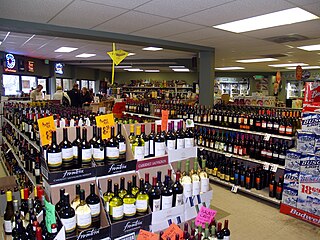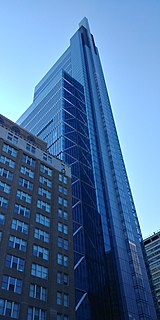Related Research Articles

The Liquor Control Board of Ontario (LCBO) is a Crown corporation that retails and distributes alcoholic beverages throughout the Canadian province of Ontario. It is accountable to the Legislative Assembly through the minister of finance. It was established in 1927 by the government of Premier George Howard Ferguson to sell liquor, wine, and beer. Such sales were banned outright in 1916 as part of prohibition in Canada. The creation of the LCBO marked an easing of the province's temperance regime. By September 2017, the LCBO was operating 651 liquor stores.
Conecuh Ridge Whiskey is a type of whiskey produced and officially marketed as "Clyde May's Alabama Style Whiskey" by Conecuh Ridge Distillery Inc. It is marketed as a high-quality aged moonshine whiskey which was produced illegally in Alabama during the mid to late 20th century. The brand was legalized by the moonshiner's son Kenny May.

A liquor store is a retail shop that predominantly sells prepackaged liquors – typically in bottles – usually intended to be consumed off the store's premises. Depending on region and local idiom, they may also be called an off-licence, off-sale, bottle shop / bottle-o liquor store (US) or other similar terms. Very limited number of jurisdictions have an alcohol monopoly. In US states that are alcoholic beverage control (ABC) states, the term ABC store may be used.

The Oregon Liquor and Cannabis Commission (OLCC), formerly known as Oregon Liquor Control Commission is a government agency of the U.S. state of Oregon. The OLCC was created by an act of the Oregon Legislative Assembly in 1933, days after the repeal of prohibition, as a means of providing control over the distribution, sales and consumption of alcoholic beverages. To this end, the agency was given the authority to regulate and license those who manufacture, sell or serve alcohol. Oregon is one of 18 alcoholic beverage control states that directly control the sales of alcoholic beverages in the United States. In 2014, the passage of Oregon Ballot Measure 91 (2014) legalized the recreational use of marijuana in Oregon and gave regulatory authority to the OLCC.
The Pennsylvania Liquor Control Board (PLCB) is an independent government agency that manages the beverage alcohol industry in Pennsylvania by administering the Pennsylvania Liquor Code. It is responsible for licensing the possession, sale, storage, transportation, importation and manufacture of wine, spirits and malt or brewed beverages in the commonwealth, as well as operating a system of liquor distribution (retailing) and providing education about the harmful effects of underage and dangerous drinking.
Alcoholic beverage control states, generally called control states, less often ABC states, are 17 states in the United States that, as of 2016, have state monopoly over the wholesaling or retailing of some or all categories of alcoholic beverages, such as beer, wine, and distilled spirits.

The Alberta Gaming, Liquor and Cannabis Commission (AGLC) is an agency of the government of the Canadian province of Alberta, and regulates alcoholic beverages, recreational cannabis, and gaming-related activities. References to cannabis were added to AGLC's name and governing legislation as cannabis in Canada moved towards legalization in 2018. AGLC was created in 1996 as the Alberta Gaming and Liquor Commission by combining the responsibilities and operations of the Alberta Liquor Control Board (ALCB), Alberta Lotteries, the Alberta Gaming Commission, Alberta Lotteries and Gaming and the Gaming Control Branch. The current Chief Executive Officer as of 2020 is Kandice Machado.

Alcohol Beverage Services, previously known as the Department of Liquor Control is a government agency within the County of Montgomery, Maryland and is the wholesaler of beer, wine and spirits alcoholic beverage throughout the county's 507-square-mile (1,310 km2) area. Montgomery County Department of Liquor Control also exercises control over retail sales for off-premises consumption, either through government-operated package stores or designated agents.
Total Wine & More is a large, family-owned, privately held American alcohol retailer founded and led by brothers David Trone and Robert Trone. Total Wine & More was named Retailer of the Year by Market Watch in 2006, Beverage Dynamics in 2008, and Wine Enthusiast Magazine in 2004 and 2014. The company is headquartered in North Bethesda, Maryland.
The Washington State Liquor and Cannabis Board, formerly the Washington State Liquor Control Board, is an administrative agency of the State of Washington. The Liquor and Cannabis Board is part of the executive branch and reports to the Governor. The board's primary function is the licensing of on and off premises establishments which sell any type of alcohol, and the enforcement and education of the state's alcohol, tobacco, and cannabis laws.

Jon D. Fox was an American Republican politician. He served as a member of Pennsylvania House of Representatives from 1985 to 1992 before being elected to the Montgomery County Board of Commissioners (1992-1995). His final political role was as a member of the U.S. House of Representatives from Pennsylvania between 1995 and 1999.

Harrah's Philadelphia Casino & Racetrack is a harness racing track and casino on the Chester, Pennsylvania waterfront. It is owned by Vici Properties and operated by Caesars Entertainment.
The Virginia Alcoholic Beverage Control Authority is one of the eleven public safety agencies under the Secretariat of Public Safety and Homeland Security for the Commonwealth. The agency administers the state's ABC laws with an emphasis on public service and a focus on protecting citizens by ensuring a safe, orderly and regulated system for convenient distribution and responsible consumption of alcohol.

The alcohol laws of Pennsylvania contain many peculiarities not found in other states, and are considered some of the strictest regulations in the United States.

Michael Coyne Turzai is an American politician and former Republican member of the Pennsylvania House of Representatives who served as Speaker of the House. He is from Allegheny County and represented the 28th legislative district since 2001. His district included the municipalities of Pine Township, Marshall Township, Bradford Woods, Franklin Park, and McCandless. Turzai served as the House Majority Leader from 2011 until 2014, and was elected Speaker in January 2015. He was a candidate for Governor of Pennsylvania in 2018 until he suspended his campaign in February 2018.
UFCW Local 1776 represents workers in Philadelphia and the surrounding suburbs for the United Food and Commercial Workers. The larger majority of their members work in grocery stores. The number 1776 refers to the historical date in Philadelphia rather than it being a sequential number of local unions.
Blue laws, also known as Sunday laws, are laws that restrict or ban some or all activities on specified days, particularly to promote the observance of a day of rest. Such laws may restrict shopping or ban sale of certain items on specific days. Blue laws are enforced in parts of the United States and Canada as well as some European countries, particularly in Austria, Germany, Switzerland, and Norway, keeping most stores closed on Sundays.

The Pittsburgh Wine Festival is an annual festival celebrating wine in Pittsburgh, Pennsylvania. The festival is sponsored by the Pennsylvania Liquor Control Board, which maintains an on-site wine shop. The Pittsburgh festival follows a similar one in Philadelphia.

Philadelphia is the center of economic activity in Pennsylvania with the headquarters of five Fortune 1000 companies located within city limits. As of 2019, the Philadelphia metropolitan area is estimated to produce a gross metropolitan product (GMP) of $490 billion, an increase from the $445 billion calculated by the Bureau of Economic Analysis for 2017, representing the eighth largest U.S. metropolitan economy. Philadelphia was rated by the GaWC as a 'Beta' city in its 2016 ranking of world cities.
References
- ↑ Brubaker, Harold (13 June 2016). "Spread the Wine". The Philadelphia Inquirer.
- ↑ "News in Brief". The Legal Intelligencer. 26 June 2006.
- 1 2 3 4 5 6 Worden, Amy (15 January 2004). "Uncorking State Stores Potential". The Philadelphia Inquirer.
- ↑ Searcy, Jay (30 December 1991). "Trotting Off To Riches With Backstreet Guys Brother". The Washington Post.
- ↑ Gough, Paul J. (26 September 2014). "State limits use of whip in harness racing". Pennsylvania Business Journal.
- ↑ Rothenberg, Stuart. "Rep Jon Fox Faces A One-Two Punch". CNN.
- 1 2 Cattabiani, Mario F. (4 January 2007). "State-store chief quits hollow job". The Philadelphia Inquirer.
- ↑ Smerconish, Michael (5 June 2003). "The Savior of the State Stores". The Philadelphia Daily News.
- ↑ May, Bruce (22 February 2004). "Chairman selects fine wine program". Pittsburge Post-Gazette.
- ↑ Lear, Len (13 December 2013). "Wine expert opera singer is the grapest - A ray of sunshine at the State Store in Flourtown". Chestnut Local.
- ↑ Ruth, Eric (1 May 2008). "Del, Pa immersed in feud and its fuled by alcohol". The News Journal.
- ↑ LaBan, Craig (3 February 2008). "Not all are toasting changes uncorked by LCB". The Philadelphia Inquirer.